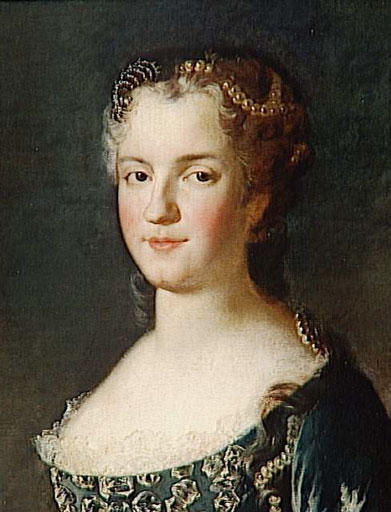When the Duc de Bourbon proclaimed that the then-15 year old Louis XV was to marry the 22-year old Marie Leszczynska, the reaction was prompt. Neither the court nor the Parisians - for once on the same page - considered the young woman suitable for the throne of France.
For one, who was she? Marie Leszczynska was the daughter of Stanislaus I Leszczynski and Catherine Opalinska - the deposed king and queen of Poland. Not only had her father lost his throne, her mother had lost her immense fortune. The family had fled to one place after another before being finally granted permission to reside in Wissembourg. As such, they were under the protection of the king of France (as France had annexed Alsace where Wissembourg is located) but they had no influence, no power, no money. Even more bleak, there was nothing to suggest that they would ever regain their former grandeur.
Thus, the main question was - what did Marie Leszczynska bring to France? As far as the public was concerned, it was not much. Her marriage would not provide France with a new, powerful ally nor with a significant dowry. In fact, her father had to borrow heavily to even scrape one together for her.
Also, there was no prestige in the marriage. To the French, the king of France was the most eligible match in the world (literally). The idea that he should be "squandered" on an unknown, impoverished princess - seven years his senior even - was completely unfathomable. Therefore, it did not take long before vicious tongues started wagging; rumours soon began that Marie Leszczynska was not just a poor choice but a dangerous one.
The entire point of importing a royal bride was to produce an heir. Therefore, her health was vital and any doubts were immense causes for concern. It is not difficult to see, then, why the rumour of Marie Leszczynska being epileptic started.
Alarmed, the court of France demanded that she be subjected to a medical exam - performed by French doctors, of course. The examination took place on 6 May 1725 by doctors Duphénix and Mouges. Their report was unequivocal - the princess was not epileptic. The rumour had it that her mother had frequently taken her to a nunnery where one of the sisters aided the symptoms. The Duc de Bourbon promptly - and discreetly - sent out scouts to discover the truth. As it happens, Catherine Opalinska was a frequent visitor to the nunnery but - as it was found - the nun was a life-long friend of hers.
Their good report was further bolstered by Marie's personal doctors who proved that her menstrual cycle was "perfectly regular" - thus alleviating accusations of infertility. On the contrary, the doctors found her health to be robust.
 |
| Marie Leszczynska |
Other unpleasant accusations were hurled her way too - that some of her fingers were webbed or even entirely paralysed (the latter being reported directly to the Duc de Bourbon by Cardinal Rohan), that she was hideously ugly etc. Neither were true nor did they need to be particularly counter proven.
Her nationality was a thorn in the eye of most people. It was said that the French "could not love" the Polish; they were considered to be republican (because their king was elected, not born to the role) and far too different from the French. There were even fears that her Polish-ness would result in a massive European war - however, this seems unlikely. Augustus II (the reigning king of Poland) was understandably not pleased at this development but upon being assured that France would not attempt to replace him with Stanislaus, he backed down.
The other European powers were equally stunned - few mentioned anything about the bride herself with the exception of the king of Sardinia. He was Louis XV's grandfather and thus in a position to publicly disclaim that the marriage was a massive mésalliance. To his shame, the Sardinian king also repeated the rumours of physical disabilities. Madame (Elizabeth Charlotte of the Palatinate) were equally aghast at the marriage, writing to her friend that the trend of mésalliances had even reached the king himself. Some has claimed that the rumour of epilepsy originated in the court of Lorraine where none other than Madame's own daughter was the reigning duchess. The point was that the Duchesse de Lorraine had several, very eligible daughters herself whom she considered to be far worthier of Louis XV - after all, they were already related!
Other, anonymous letters arrived, all warning against the ghastly deformities said to plague the queen-to-be. Hunchbacked, one-eyed - if even half the things said against her were true, she would truly have been an unfortunate woman. Some even pointed to the fact that Marie was unmarried at the ripe old age of 22 - surely something must be wrong with her? Poor Marie!
The people were quickly won over by Marie Leszczynska as she travelled toward Versailles. Once they saw her, they could dismiss the rumours of hideousness and her grace and kindness did much to endear her to them. It certainly helped that she would become pregnant very quickly after the marriage which further disproved any theory of infertility - on the contrary, as she would go on to be pregnant for a decade in total.

No comments:
Post a Comment